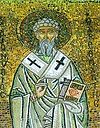

| Previous day | Next day |
| Old Style
October 3
|
Saturday |
New Style
October 16
|
| 17th Week after Pentecost. Tone 7. | No fast.
|
![]() Hieromartyrs Dionysius the Areopagite (96), bishop of Athens, the priest Rusticus, and the deacon Eleutherius (96).
Hieromartyrs Dionysius the Areopagite (96), bishop of Athens, the priest Rusticus, and the deacon Eleutherius (96).
St. John the Chozebite, bishop of Caesarea in Palestine (532). Blessed Hesychius the Silent, of Mt. Horeb (6th c.). St. Dionysius, recluse of the Kiev Caves (15th c.). Uncovering of the relics of St. Joseph, elder, of Optina Monastery (1988).
New Hiero-confessor Agathangelus (Preobrazhensky), metropolitan of Yaroslavl (1928).
St. Jerome of Aegina (1966). Hieromartyrs Dionysius, bishop of Alexandria, and the deacons Gaius and Faustus (ca. 265). St. Paisius I, patriarch of Serbia (1647).
Repose of Blessed Olga, fool-for-Christ, of Bogdanoya Bari and St. Petersburg (1960).
Thoughts for Each Day of the Year
According to the Daily Church Readings from the Word of God
By St. Theophan the Recluse

Saturday. [I Cor. 15:58-16:3; Luke 5:17-26]
But that ye may know that the Son of man hath power on earth to forgive sins, He said to the paralytic, I say unto thee, Arise, and take up they couch, and go into thine house. Remission of sins is an inner, spiritual miracle; healing from paralysis is an outer miracle—the natural acting of God in the world, a physical miracle. The flowing in of God’s power is justified and confirmed by this event in the moral realm, and in the movement of phenomena in the physical world. The latter is in view of the former, for in the former lies the goal of everything. The Lord does not coerce one’s freedom, but gives understanding, inspires, and amazes. One of the best means for this is an outer miracle. This came to be when man became a rational creature, ruled by freedom. This connection is so essential, that those who reject the supernatural action of God in the world also reject the freedom of man, along with the recognition that the latter must necessarily call forth the former. On the other hand, those who confess the truth of God’s influence in the world beyond a natural flow of events can say boldly: we can feel that we are free. The recognition of freedom is as strong and irresistible as the recognition of one’s existence. Freedom urgently demands direct providential actions of God: consequently the acknowledgement of these actions stands as firmly as the recognition of freedom.
Articles
 Martyrs Rusticus the Presbyter and Eleutherius the DeaconSaints Rusticus and Eleutherius were disciples of Saint Dionysius the Areopagite. |
 Venerable Hesychius of Mount HorebSaint Hesychius the Silent of Mt. Horeb, lived during the sixth century at one of the monasteries on Mt. Horeb, and at first he was not a very fervent monk. |
 Venerable Dionysius the Recluse of the Kiev CavesSaint Dionysius, Hermit of the Kiev Caves, Far Caves, called Schepa, is mentioned briefly in the Kiev Caves Paterikon. |


